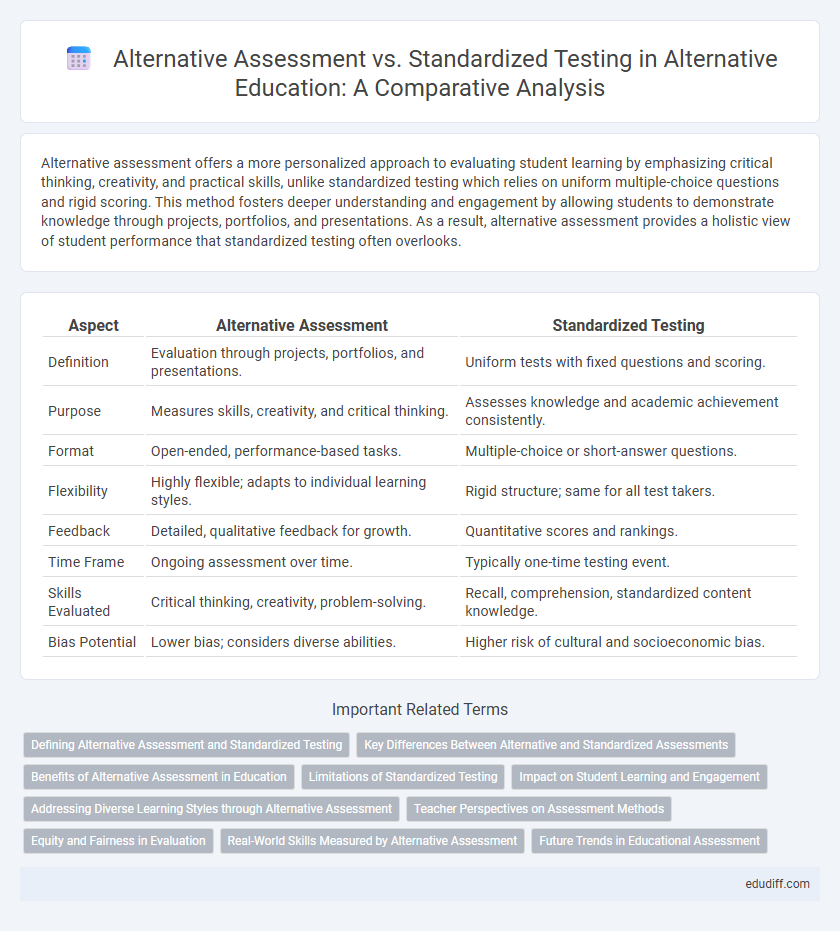Alternative assessment offers a more personalized approach to evaluating student learning by emphasizing critical thinking, creativity, and practical skills, unlike standardized testing which relies on uniform multiple-choice questions and rigid scoring. This method fosters deeper understanding and engagement by allowing students to demonstrate knowledge through projects, portfolios, and presentations. As a result, alternative assessment provides a holistic view of student performance that standardized testing often overlooks.
Table of Comparison
| Aspect | Alternative Assessment | Standardized Testing |
|---|---|---|
| Definition | Evaluation through projects, portfolios, and presentations. | Uniform tests with fixed questions and scoring. |
| Purpose | Measures skills, creativity, and critical thinking. | Assesses knowledge and academic achievement consistently. |
| Format | Open-ended, performance-based tasks. | Multiple-choice or short-answer questions. |
| Flexibility | Highly flexible; adapts to individual learning styles. | Rigid structure; same for all test takers. |
| Feedback | Detailed, qualitative feedback for growth. | Quantitative scores and rankings. |
| Time Frame | Ongoing assessment over time. | Typically one-time testing event. |
| Skills Evaluated | Critical thinking, creativity, problem-solving. | Recall, comprehension, standardized content knowledge. |
| Bias Potential | Lower bias; considers diverse abilities. | Higher risk of cultural and socioeconomic bias. |
Defining Alternative Assessment and Standardized Testing
Alternative assessment encompasses diverse evaluation methods such as portfolios, performance tasks, and self-assessments, emphasizing student skills, creativity, and critical thinking beyond traditional testing metrics. Standardized testing involves uniform exams administered and scored consistently across large populations, focusing on quantifiable knowledge and comparative analysis of student performance. This distinction highlights alternative assessment's role in fostering individualized learning insights while standardized tests primarily measure cognitive proficiency and content mastery.
Key Differences Between Alternative and Standardized Assessments
Alternative assessments prioritize performance-based tasks, such as portfolios, presentations, and projects, allowing students to demonstrate understanding through practical application and critical thinking. Standardized tests rely on uniform multiple-choice or short-answer formats, measuring knowledge against a fixed benchmark with quantifiable scores. Alternative assessments offer personalized feedback and assess higher-order skills, whereas standardized testing emphasizes comparability and large-scale data analysis.
Benefits of Alternative Assessment in Education
Alternative assessment enhances personalized learning by evaluating students through projects, portfolios, and performances that reflect real-world skills and critical thinking. This method provides more comprehensive feedback on student progress, accommodating diverse learning styles and fostering deeper understanding. Unlike standardized testing, alternative assessments reduce test anxiety and encourage continuous growth by emphasizing creativity and applied knowledge.
Limitations of Standardized Testing
Standardized testing often fails to capture the full range of student abilities, emphasizing memorization over critical thinking and creativity. It can create high-stress environments that negatively impact student performance and well-being. Moreover, standardized tests frequently do not account for diverse learning styles, cultural backgrounds, or individual progress, limiting their effectiveness in assessing true academic achievement.
Impact on Student Learning and Engagement
Alternative assessment methods promote deeper student learning by emphasizing critical thinking, creativity, and real-world application, which standardized testing often overlooks. These assessments increase student engagement through personalized feedback and interactive tasks, fostering motivation and ownership of learning. In contrast, standardized tests typically encourage rote memorization and test-taking strategies that may hinder genuine understanding and diminish student interest.
Addressing Diverse Learning Styles through Alternative Assessment
Alternative assessment offers tailored evaluation methods such as portfolios, performance tasks, and self-assessments that effectively address diverse learning styles by allowing students to demonstrate knowledge in various formats. Unlike standardized testing, which often relies on uniform multiple-choice questions, alternative assessments accommodate visual, auditory, kinesthetic, and interpersonal learners by emphasizing applied skills and critical thinking. This approach enhances student engagement and provides educators with a comprehensive understanding of individual learning strengths and needs.
Teacher Perspectives on Assessment Methods
Teachers prioritize alternative assessments for their ability to capture diverse student skills and provide personalized feedback, contrasting with standardized testing's rigid structure and one-size-fits-all approach. Many educators emphasize that alternative methods foster creativity, critical thinking, and practical application, aligning better with varied learning styles and real-world competencies. Teacher surveys reveal higher satisfaction with alternative assessments due to increased student engagement and more meaningful insights into individual progress.
Equity and Fairness in Evaluation
Alternative assessment methods provide a more equitable evaluation by accommodating diverse learning styles and cultural backgrounds, reducing biases inherent in standardized testing. These approaches emphasize personalized feedback, formative assessments, and portfolio reviews, which offer a comprehensive view of student abilities beyond test scores. Emphasizing equity and fairness, alternative assessments mitigate socioeconomic disparities and foster inclusive educational environments.
Real-World Skills Measured by Alternative Assessment
Alternative assessments emphasize practical skills such as critical thinking, problem-solving, collaboration, and creativity, which are often overlooked by standardized tests. These assessments provide authentic evaluation through projects, presentations, and portfolios that mirror real-world tasks and challenges. By measuring applied knowledge and adaptive learning, alternative assessment aligns more closely with workplace demands and lifelong learning competencies.
Future Trends in Educational Assessment
Future trends in educational assessment emphasize alternative assessment methods, such as portfolios, performance tasks, and formative assessments, to provide a comprehensive evaluation of student learning beyond standardized test scores. These approaches prioritize critical thinking, creativity, and real-world problem-solving skills essential for 21st-century education. Technology integration and personalized learning analytics are expected to further enhance the accuracy and relevance of alternative assessments in capturing diverse student abilities.
Alternative Assessment vs Standardized Testing Infographic

 edudiff.com
edudiff.com